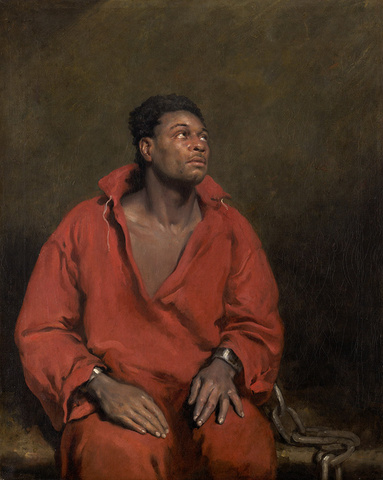text

"The Captive Slave" by John Philip Simpson, 1827 Simpson's painting which appears in the "Afro-Atlantic Histories" exhibition, both draws on and subverts artistic traditions, seemingly to send an abolitionist message. "Simpson’s painting uses a predictable visual language of enslavement, shackles peeking out from under the man’s orange jumpsuit like carceral bracelets. A heavy chain weighs down his arm, the links the size of his large hands. Those hands exude power, but power tamed. Simpson played with convention, using the most obvious symbols of slavery and borrowing from representations of religious figures. He also subverted the portraiture of the wealthy. Art lovers who saw The Captive Slave in the 1820s may have gasped at its audacious departure from longstanding representations of slavery in English art. The abject became the subject." --Cynthia R. Greenlee, National Gallery of Art |
text
This course will trace several parallel and divergent features of British and American writings of the period, with emphasis on the cultural environments and formal features of poetic, fictional, dramatic and argumentative texts.
We will pay special attention to three questions: How did our authors respond to themes of tradition/history and memory? How did conceptions of race influence attitudes toward empire and war? And finally, was a better future for the inhabitants of Britain/the United States possible, especially in the aftermath of the horrors of WWI?
Course texts may include: John Ruskin, Modern Painters; Charlotte Mew, “The Trees are Down”; John Muir, The Mountains of California; William Morris, “Sir Peter Harpdon’s End”; Alfred Tennyson, “In Memoriam,” “The Holy Grail”; Mark Twain, A Connecticut Yankee in King Arthur’s Court; Margaret Fuller, Woman in the Nineteenth Century; John Stuart Mill, The Subjection of Women; Mary Prince, The History of Mary Prince; Hannah Crafts, A Bondwoman’s Narrative; Elizabeth Gaskell, Mary Barton; Rebecca Harding Davis, Life in the Iron Mills; Upton Sinclair; The Jungle; William Morris, “The Future of Society”, News from Nowhere; William Dean Howells, A Traveler from Altruria; Charlotte Perkins Gilman, Herland.
Background: Jonathan Dymond, essays on war; Responses to WWI: Sassoon, Rosenberg, Owen, Thomas Hardy, Alice Meynell, Charlotte Mew (also selections by German French poets); Mark Twain, The War Prayer, Susan Glaspell, The Inheritance.
Syllabus for 7500 Transatlantic Contrasts
Tradition and Upheaval in British and American Literature 1840-1920
This course will trace several parallel and divergent features of British and American writings of the period, with emphasis on the cultural environments and formal features of poetic, fictional, dramatic and argumentative texts.
We will pay special attention to three questions: How did our authors respond to themes of tradition/history and memory? How did conceptions of race influence attitudes toward empire and war? And finally, was a better future for the inhabitants of Britain/the United States possible, especially in the aftermath of the horrors of WWI?
Course texts may include: John Ruskin, Modern Painters; Charlotte Mew, “The Trees are Down”; John Muir, The Mountains of California; William Morris, “Sir Peter Harpdon’s End”; Alfred Tennyson, “In Memoriam,” “The Holy Grail”; Mark Twain, A Connecticut Yankee in King Arthur’s Court; Margaret Fuller, Woman in the Nineteenth Century; John Stuart Mill, The Subjection of Women; Mary Prince, The History of Mary Prince; Hannah Crafts, A Bondwoman’s Narrative; Elizabeth Gaskell, Mary Barton; Rebecca Harding Davis, Life in the Iron Mills; Upton Sinclair; The Jungle; William Morris, “The Future of Society”, News from Nowhere; William Dean Howells, A Traveler from Altruria; Charlotte Perkins Gilman, Herland.
Background: Jonathan Dymond, essays on war; Responses to WWI: Sassoon, Rosenberg, Owen, Thomas Hardy, Alice Meynell, Charlotte Mew (also selections by German French poets); Mark Twain, The War Prayer, Susan Glaspell, The Inheritance.
Tentative Readings and Schedule for Fall 2023
Week 1
August 22 T introduction
August 24 Th Caroline Norton; John Stuart Mill and Harriet Taylor Mill, The Subjection of Women
Week 2
August 29 T Margaret Fuller, Woman in the Nineteenth Century
August 31 Th Mary Prince,The History of Mary Prince
Week 3
September 5 T Harriet Jacobs, Incidents in the Life of a Slave Girl
September 7 Th Victor Sèjour, “The Mulatto”; Frances Harper, poems; report on Harriet Wilson, Our Nig
Week 4
September 12 T selection from Das Kapital; Elizabeth Gaskell, Mary Barton
September 14 Elizabeth Gaskell, Mary Barton
Week 5
September 19 T Chartist and other working-class poems: Jones, Laycock, Bamford, Johnson, Hamilton
September 21 Th working-class autobiographies: Ellen Johnston and Elizabeth Campbell
Week 6
September 26th T Rebecca Harding Davis, Life in the Iron Mills
September 28th Th Hamlin Garland, Main Travelled Roads
Week 7
October 3 T Tennyson, “In Memoriam”
October 5 Tennyson, Th “In Memoriam”
Week 8
October 10 T Oscar Wilde, “The Ballad of Reading Gaol”
October 12 Th American poetry selection, to be determined
Week 9
October 17 T John Ruskin, selections from Fors Clavigera; William Morris, News from Nowhere, first half
October 19 Th William Morris, “The Society of the Future,” News from Nowhere, second half
Week 10
October 24T Charlotte Perkins Gilman, Herland
October 26 Th Ethel Carnie, Miss Nobody
Week 11
October 31 T Ethel Carnie, Miss Nobody; Jack London, “To Build a Fire”
November 2 Th Upton Sinclair, The Jungle (first half)
Week 12
November 7 T Bankim Chandra Chatterjee, Anandamath
November 9 Th Alicia Callahan, Wynema: A Child of the Forest
Week 13
November 16 --------
November 18 -------
Thanksgiving week
Week 14
November 28 T First World War: poetry by Isaac Rosenberg, Wilfred Owen, Siegfried Sassoon, German and French war poets
November 30 Th First World War, poetry by women poets of war, Charlotte Mew
Week 15
December 5 T Mark Twain, The War Prayer; Susan Glaspell, The Inheritors
December 7 Th graduate student reports
Exam week: Tuesday December 12th, final exam meeting, graduate student reports
Submission of final 15+ page essay by Friday of exam week, December 15th